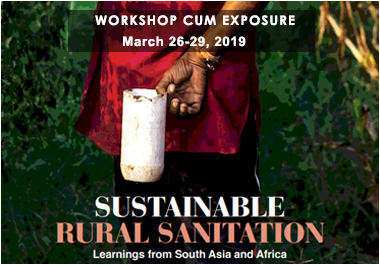National Consultation on sustainable rural sanitation
 Date: October 06, 2016. Duration: 10.30 am to 2 pm
Date: October 06, 2016. Duration: 10.30 am to 2 pm
Venue: CSE’s office, 4th Floor, Core 6 A India Habitat Centre, Lodhi Road
Objective of the meeting: Of the 1 billion people globally who have no toilet, India accounts for more than 550 million and nearly 760 million people do not have access to improved sanitation says the recent report of the Joint Monitoring Programme (JMP) of the United Nations International Children’s Emergency Fund (UNICEF) and the World Health Organization (WHO). Fifty per cent of India’s population defecates in the open. Ensuring basic hygiene for all is a major task for the Indian government. There is a need to understand the reason for the poor state of sanitation in India – is it poverty, lack of access to water, unavailability of land or lack of delivery of government programmes or that Indians do not believe that open defecation leads to health hazards? This is a big question that confronts public policy today.
Sikkim, Haryana and Kerala, nevertheless, excelled in sanitation programmes, with Sikkim topping with 100 per cent sanitation coverage. The toilet programmes in the states like Jharkhand, Bihar, Odisha failed miserably. The meeting intends to examine why toilet programmes are failing in India, why some states are lagging behind, bottle necks in delivery mechanism and challenges of solid waste and wastewater management in rural India.
Centre for Science and Environment (CSE), New Delhi is conducting a half day national consultation on October 06, 2016 to get a better understanding of the issues on site. The meeting will bring together the sanitation champions, failed states, technical experts/consultants, government officials, non-profits and donors.
Draft structure of the meeting
Registration: 10.30-11 AM
Session 1: Welcome address – Setting up the context – CSE
Session 2: Presentation on sanitation coverage in India – Sunita Narain, Director General, CSE
Session 3: Remarks by Chief Guest : Shri. Parameswaran Iyer, Secretary, Ministry of Drinking Water & Sanitation
Session 4: Experience sharing - Talk by the champion states and neighbouring country:
States: Sikkim, Haryana, West Bengal, (North 24 Parganas), Sindhudurg (Maharashtra); Country: Bangladesh
Session 5: Panel discussion: -12.40- 1.30 PM
Key issues to be discussed: Identifying the issues, is toilet programme failing in India, why the states are lagging behind, bottle necks, solid liquid waste management, gender, poverty, toilet design, land availability, cost and health impacts of and way forward –
Chairperson: CSE
Participants: District Magistrates, District Coordinator, NGOs, donors, health experts, institutions, communication specialist
Vote of thanks – CSE
Lunch up to 2 PM
Participation through invitation only
Contact:
Sushmita Sengupta
Programme Manager
Water Programme
Email: sushmita@cseindia.org
Rashmi Verma
Senior Researcher
Water Programme
Email: rashmi@cseindia.org
Share this article